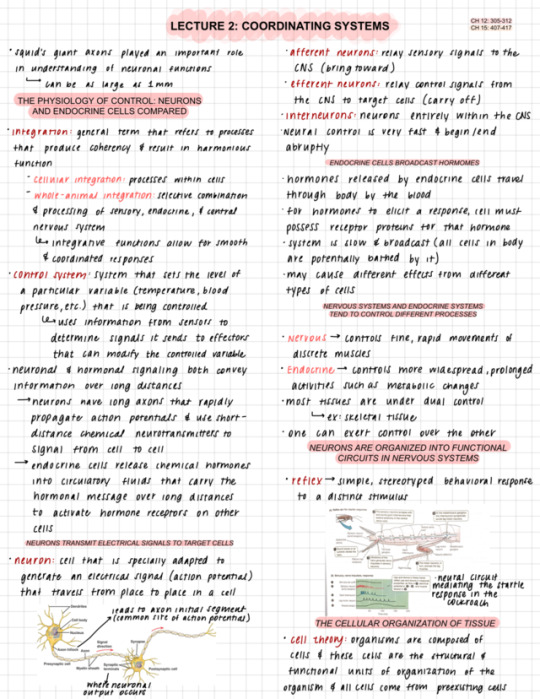Hey, I'm Amy!I'm doing my second year of uni this yearThis is a (secondary) studyspo blog (Main: you-are-in-my-veins-you-fuxk)Feel free to message me!
Don't wanna be here? Send us removal request.
Text
lab safety but the teacher just wants you to die
232K notes
·
View notes
Text
How to Deal with Study Burnout
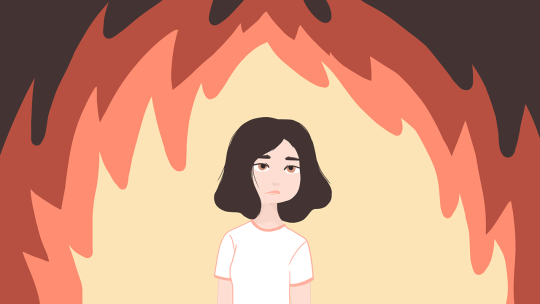
As students in this day and age, it’s quite common for us to juggle rigorous academic responsibilities and overwhelming extracurricular activities. As a result, we might feel burnt out. But what exactly is burnout?
Burnout is when you feel physically and mentally exhausted as a result of constantly lacking the energy required to fulfill the demands of your studying.
Burnout can be broken down into three parts:
Exhaustion is what causes you to feel tired all the time and unable to concentrate. You could also get sick or have trouble sleeping.
Cynicism or depersonalization is when you feel disconnected from those around you, e.g. your friends and family.
Inefficacy is a decrease in productivity, efficiency, or quality of your work.
How do you know if you have burnout?
Symptoms may vary, but they include:
Being unable to absorb new information
Intellectual exhaustion
Decreasing academic performance and productivity
Feeling like you need to prove yourself
Making yourself work even more, even though you’re exhausted or being unwilling to study further
Neglecting your needs
Long term fatigue
Showing disinterest in things you normally enjoy, e.g. hobbies or friends
Denying that something’s wrong with you (may manifest in the form of aggression)
Avoiding social interaction
Feeling empty and depressed
What can I do to fix it?
Here are some short term solutions for dealing with burnout.

1. Take a power nap Power naps are life changing. They help you recharge your energy and get you ready to start working again. They also improve learning, memory, creativity, alertness, and mood. I would recommend napping for 30 minutes at most, because anything more will lead to a longer sleep session.
Optional: drink coffee before your nap - something that takes a short while to consume like a shot of espresso - so that you’ll feel alert and revitalized afterwards!
2. Take a shower A cold one will wake you up, but a warm one will calm you down. I suggest starting with warm water, then ending with cold water.
3. Exercise Whether it’s playing soccer or doing yoga, the important thing is to get moving! Exercise releases endorphins or happy hormones that help you combat stress.
4. Run a quick errand This will help take your mind off things while also getting something done! You’ll also end up walking, which is technically a form of exercise.
5. Call or visit a friend Sometimes what we’re lacking is social interaction, and hanging out with a friend definitely helps. Whether it’s providing you with a distraction or giving emotional support, your friends are always there to help you. Plus, science has shown that being with friends reduces your cortisol (stress hormone) levels.
6. Eat a snack Preferably a healthy one. Eat something with proteins, vitamins, and fibers to boost your mood. Here’s a list of mood boosting foods.
7. Surf the web This requires A TON of discipline, but it’s definitely a game changer. Surfing the web is one of the most relaxing things you could do. I personally look for a good laugh during my study breaks, so I’d watch a comedy or scroll through memes to get those happy hormones up and running.
8. Do an activity you find interesting, e.g. a hobby We all need happiness in our lives, and our hobbies are perhaps the best way to find that joy. You could sit down with a page turning adventure, or go outside and shoot hoops, or listen to a podcast, or even bullet journal, as long as you’re having a good time.
9. Listen to music Music is one of the ways we gain energy, so I always make time for it during the day. However, you should choose the right music, because not all the music you love is going to make you feel energized. For me, it’s pop punk with hard hitting beats, thundering guitars, and really upbeat, enthusiastic vocals. Some of you might be energized by mellow music with dreamy vocals that make you feel like you’re floating in the clouds. If you choose the wrong music, you might just end up feeling sluggish and drained.
10. Get some fresh air Your brain needs 20% of the oxygen in your body. Fresh air brings more oxygen to your brain so that you can think more clearly, feel less tired, and concentrate more easily.
How do I make sure I don’t get it in the future?
Avoiding study burnout in the long term has a lot to do with our study habits - as well as our daily habits. We need to make sure that our bodies and minds receive the things they need, and that we aren’t overworking them.
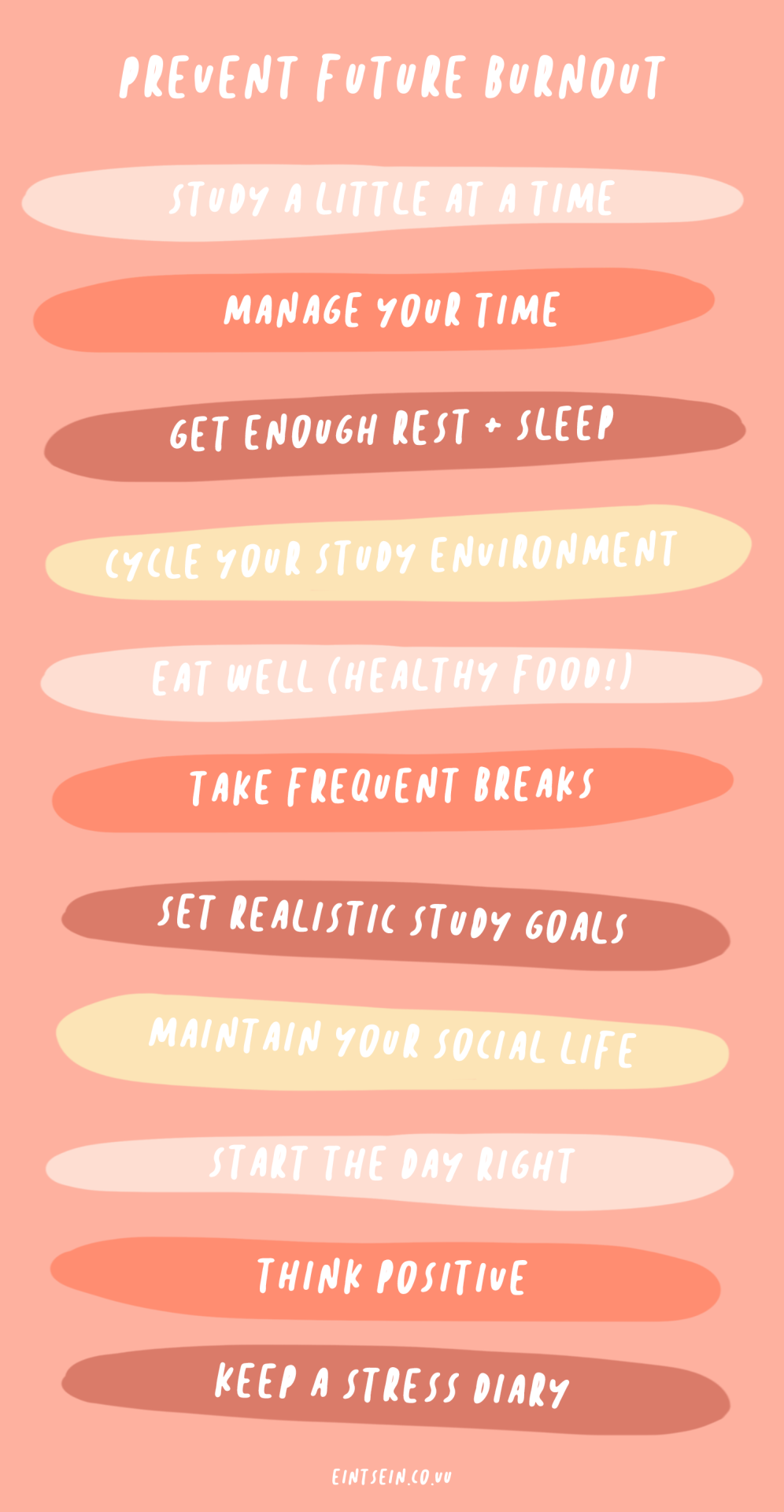
1. Study a little at a time Break up your notes into smaller, more easily digestible pieces and learn a little at a time. This way, you’re not overwhelming your brain, and you have time to let that new knowledge settle in.
2. Time management Having a good study schedule is crucial in preventing burnout. You don’t want to force yourself to work at your slow hours. Aside from that, you definitely shouldn’t leave things until the last minute, and sticking to a schdule will help you pace yourself. Here’s a post I wrote on How to Make an Efficient Revision Schedule and How to Beat Procrastination.
3. Get enough rest I cannot stress enough that sleep is so important for you. It improves your cognitive functioning and also enhances your mood, making it less likely that you’ll get burnt out. Make sure to take power naps, too, if you feel like you need them.
You also really shouldn’t pull all-nighters. Sleep is also involved in cementing memories in your brain, so if you study a little before you sleep, you’re bound to remember more than if you studied a chapter during an all nighter.
Having trouble sleeping? Here’s a post I made about my night routine and how to get better sleep.
4. Cycle your study environments Your body and mind are bound to get tired from being in the same location for prolonged periods of time. The best way to fix that is to study in different places: at your desk, your backyard, the dining table, a cafe, a friend’s house, the library, etc.You should find a frequency that works for you. I like to switch it up every 2-3 days; some people change locations every week.
5. Eat well As I’ve mentioned before, healthy foods with protein, vitamins, and fiber greatly improve your mood and your physical health. Proper nutrition will give your brain the power it needs to push through. Also make sure not to skip meals; honestly you’ll just end up feeling terrible afterwards.
6. Take frequent breaks Let’s face it, we’re human, we’re bound to get tired from studying for a long time. Taking breaks enables our brains to digest the information we just learned in a pace that works for it. Breaks also help us focus on something other than studying, so that when we do get back to it, we’ll be ready to digest even more information.
7. Set realistic study goals You’re gonna memorize all 500 pages of your biology textbook in one day? Good luck with that. Some of you might be compulsive studiers, but this kind of habit isn’t very good for your brain or your physical health. Studies have shown that excess studying can lead to lower productivity, fatigue, and - you guessed it - burnout. In the end, this will result in lower academic performance, perhaps even in the long run. So instead of trying to study so much in one sitting or one day, break up your material into chunks.
8. Maintain your social life Wherever you lie on the introvert-extrovert spectrum, everyone needs social interaction once in a while. It keeps you sane and healthy. Go out with your friends, have a sleepover, or maybe even a study date.
9. Start the day right What we do in the morning can significantly affect our mood for the rest of the day. Sometimes we don’t even feel like getting up in the morning, or doing anything that day. One thing you should do is create a morning routine you enjoy to jumpstart your day. Here are 8 Morning Habits for Productivity.
10. Think positive When we’re feeling burnt out, it’s hard to not think negatively about everything. In reality, that just makes our condition worse. So think positively! Start small, like congratulating yourself for getting out of bed today, and then work your way up to bigger accomplishments, like finishing 2 chapters of your textbook.
11. Keep a stress diary This is kind of a new concept for me, but it’s really great. How it works is that each day, you would write down all the things that made you stressed and how they made you stressed. This will help you identify the things you’re doing that’s causing your burnout, e.g.
Too long study hours? take regular breaks
Too much time in the same place? cycle your study environment
Not eating properly? set aside time to eat healthy meals at least 2 times a day
Not doing the things you love? schedule in time for that, e.g. during your long breaks
Not getting enough human interaction? make a study group
Too much negative thinking? adopt a positive mindset (you can always start small)
Not getting enough sleep? fix your sleep schedule
And that’s all I have for you guys this time. Hope these tips will help you manage your stress and study burnout whenever you have them. And if you have any questions, don’t hesitate to drop an ask!
P.S. if any of you want to see the images in this post in better quality, click here (link to google drive)
29K notes
·
View notes
Photo
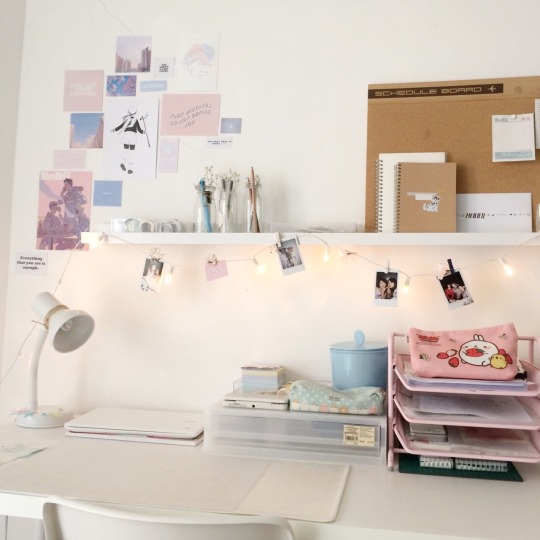

09.10.16 cleaning my desk is so satisfying 💪🏻 wish me luck for the start of yr 12 tomorrow!
24K notes
·
View notes
Text
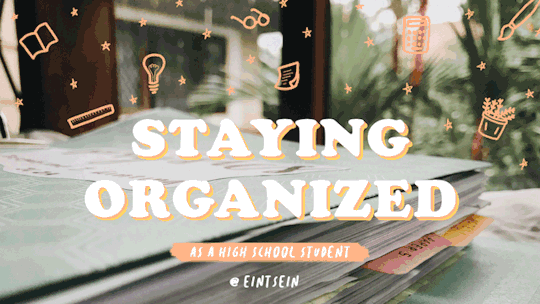
Hey guys, so I’m nearing the end of my senior year, and it’s been great so far! I accomplished my academic tasks efficiently and didn’t burn myself out, and I think the main contributor to my success as a student is my organization system. This system has been refined throughout my high school years, but I think now I’ve finally found the most effective methods.
Please remember that this isn’t the only organization system you can adopt; this is just the one that works the best for me, and I hope that by sharing it with you, you’ll gain a new perspective on how to stay organized as a high school student.

The first thing I wanna talk about is my notebook system, which I briefly mentioned in my Guide to Note-Taking.
My notebook system comprises three types of notebooks: the Everything Notebook, the subject notebook, and the revision notebook.
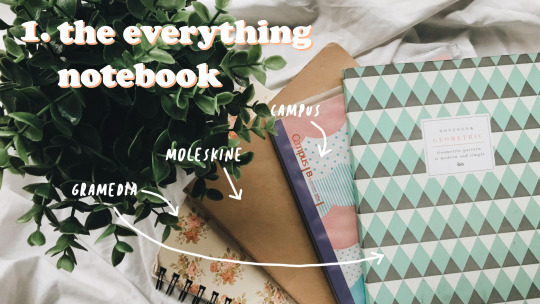
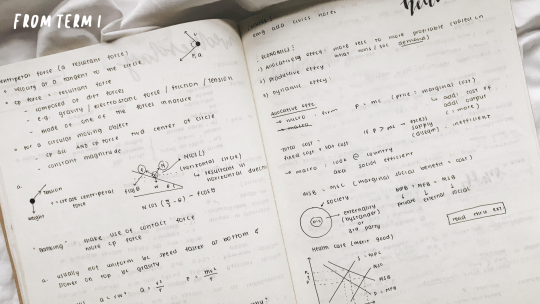
The Everything Notebook
The first stage is in-class notes. I only bring one notebook to school every day. I call it my Everything Notebook, and this is where I write down all of the notes I take in class. This way, I don’t have to lug around six notebooks where I’m only going to use a few pages in each of them that day.
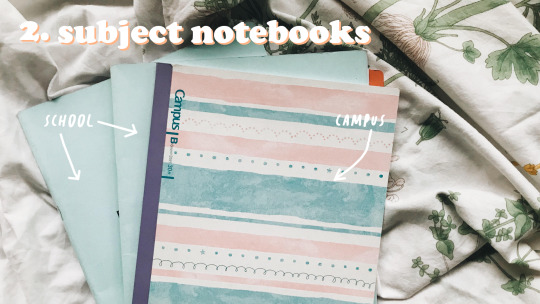
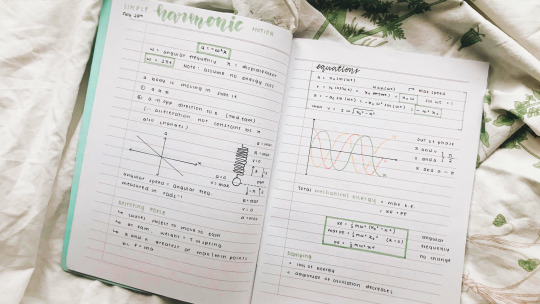
Subject Notebooks
At the end of the day, I would revise my notes and compare them to the syllabus so I know where we are in the learning process. I would then transfer my class notes from my Everything Notebook to my different subject notebooks. This is stage two. I also start to jazz up my notes because I use the notes in my subject notebooks to study for tests.
In addition to my class notes, I include material from my teachers’ notes that they might not have elaborated on, as well as points in the syllabus (I’m currently taking A2) that were only glazed over briefly, or not at all, in some cases. (Note: this does not mean they completely skip a chapter or topic; it’s more like they missed a few bullet points that should be in my notes but aren’t. An example would be if we’re learning about phenol reactions and the teacher forgot to mention the use of FeCl3 as a test for phenol.)
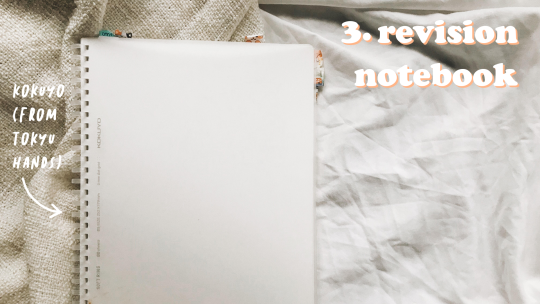
Revision Notebooks
Stage three comes a little later, when exam week is just around the corner. Essentially, I rewrite and improve my notes from my five different subject notebooks into a single revision notebook or binder. (Recently, I’ve opted for a revision notebook because they’re lighter and easier to carry around.)

Because my teachers don’t always teach in the order of the syllabus, the first thing I do is organize my notes according to the syllabus. I would then fill in any other missing gaps in the material that hadn’t been filled in stage two.
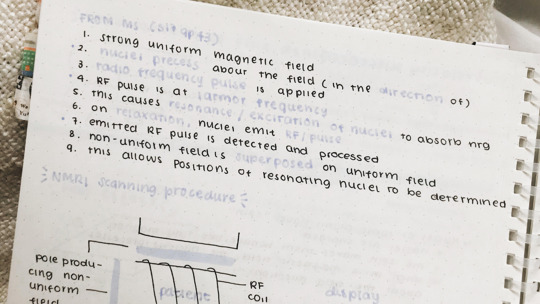
When compiling material for my revision notebook, I use as many sources as possible: my own notes, my teachers’ notes, youtube videos, online sites, and my favorite, the mark scheme! I add in some answers from past papers (explanations only, so no calculations) mainly to secure marks. It’s safer to memorize definitions straight from the mark scheme than from the textbook or from handouts. I also do this to ease my memorization, especially for topics that require lengthy explanations. It’s a lot easier to remember the 6 points I need to explain the principles of NMRI than to remember everything in the four-page handout my teacher gave me.

Folders and binders are essential to organizing your papers. Some people keep a single accordion folder for all their papers, but for me it’s just too heavy to carry around all the time. The same goes for subject folders that are brought to school every day.
Instead, my binder/folder system comprises my Everything Folder and my subject binders.
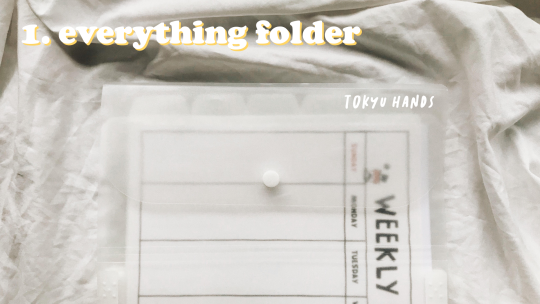
The Everything Folder
The folder I carry with me to school every day is this A4 folder I got from Tokyu Hands. It has 5 pockets, one for each day of the week, so all the papers I receive on Monday will go behind the first divider, and so on.
Some people also keep blank papers in their folders; I don’t because my school has its own lined paper and graphing pads that I keep under my desk that I use if a teacher asks us to do an assignment on those papers. If I do work at home, I prefer to just use a plain A4 paper or a legal pad.

Subject Binders
At the end of the week, I’ll sort my papers into my subject binders. Sometimes I’ll keep some papers in the folder if I think I’ll be needing it the next week. This usually only applies to worksheets because all my teachers’ notes are available on Google Classroom, so I can access them even if I don’t physically have them.
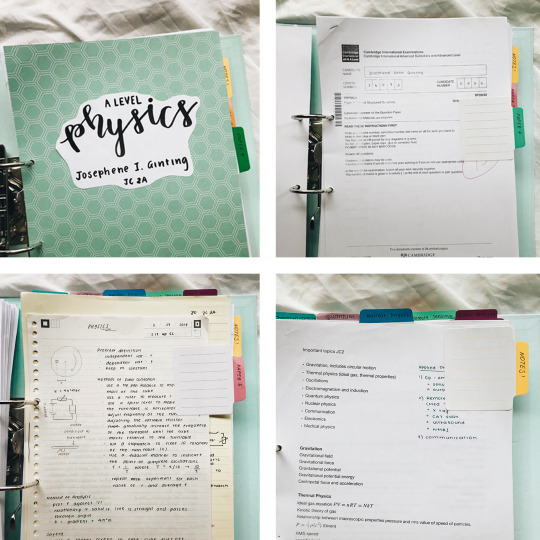
Each of these binders have sections inside them:
Physics: 1 for handouts, notes, and tests, 1 for Paper 4 (Theory), 1 for Paper 5 (Practical Planning). I included extra tabs to mark the different topics in the handouts section.
Chemistry: same as Physics.
Economics: 1 for Paper 3 (MCQ), 1 for Paper 4 (Case Study and Essay). A lot of my Economics material is online, though.
English: 1 for Paper 3 (Text and Discourse analysis), and 2 for Paper 4 (Language Topics, which includes 1 for Child Language Acquisition, 1 for World Englishes). Past papers, handouts, and notes all go under their respective topics.
Mathematics: I just keep everything together because I never revise math and just constantly do past papers.
This makes it easier for me to revise each subject because I can just take one binder with me instead of a messy folder with everything just shoved in there.

I keep a magazine file for each of my A-Level subjects (English and Mathematics are combined). All my textbooks, revision guides, and subject notebooks are kept here, so if I need to revise one subject, that’s the magazine file I’ll take out.
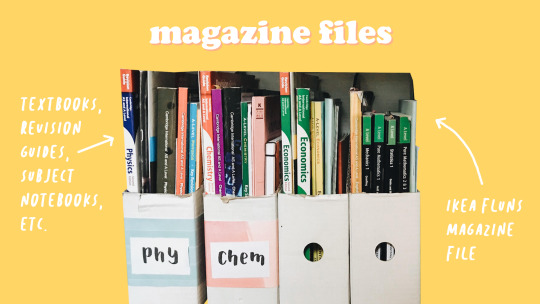
These magazine files prevent any small things (like my book of flashcards) from being shoved to the back of my bookshelf, or materials from different subjects from getting mixed up.

In my senior year, I mostly plan using this app called Edo Agenda. It syncs across all my devices for free and has all the features I need: a to do list to organize tasks, monthly and weekly calendars to organize events, a journal to organize notes and memos.
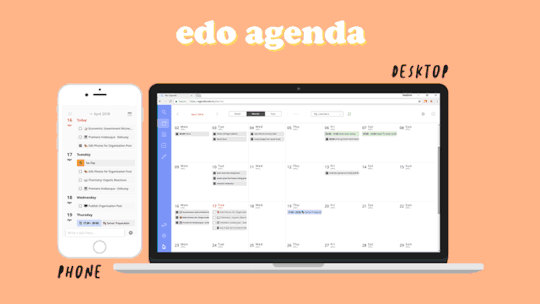
I used to bullet journal regularly, but it takes too much time during weekdays, so now I just bullet journal for the therapeutic effects it gives me, and I use an app for organizing tasks and events. Sometimes at the end of each week, I’ll transfer my tasks to my bullet journal and then decorate the page, but again, this is just for its therapy.

Organizing your school supplies is just as important as organizing your papers and notes. With a more organized backpack and pencil case, you won’t waste time looking for your things at the bottom of an abyss.
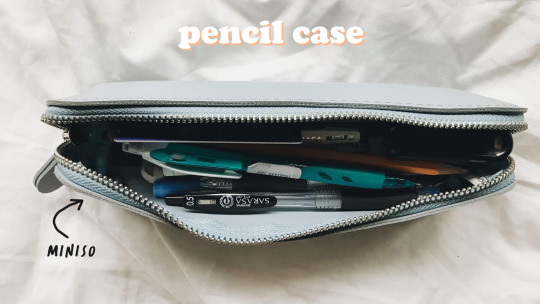
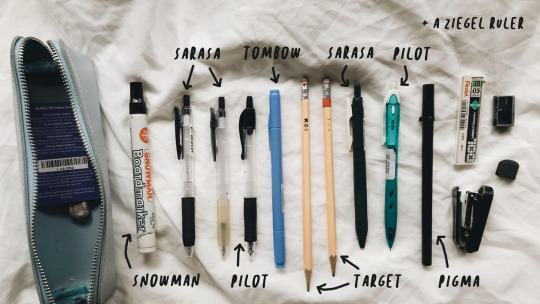
Pencil Case
I don’t find it necessary to bring so much stationery to school unless I plan on making notes at school (usually during revision week).
Backpack
Because we’re already in the revision term, I don’t really carry a lot of things in my everyday backpack, just the following:
Pencil case
Everything Notebook
Everything Folder
Revision notebook
Kindle
Phone
Wallet
Earphones
Calculator
Speaker
Drinking bottle
A pouch with things like a hairbrush, pads, and lip balm
And that’s all for now! I hope this post will help you organize your school life (if you haven’t already) or at least provide some useful insights on some ways to stay organized as a high school student.
45K notes
·
View notes
Photo


One of my study references from neuro last semester. That class was hell, but it’s over now, thank god, although I will have the same professor for a class this fall. We’ll see how that turns out.
1K notes
·
View notes
Photo

You don’t have to control your thoughts. You just have to stop letting them control you.
7K notes
·
View notes
Text
How I Got Straight A’s in My First Year of University
I was so proud of myself when I received firsts (that’s A’s for those not attending uni in the UK) on all of my assessments in my first year at university. Here are some tips for y’all to try at any point in university. They may be specific at times to my experience—my degree is in the social sciences and humanities, and I’m studying in the UK—but I did try to make them more generally applicable, and hopefully they should be helpful to someone out there.
Part One: Everyday Study Routine
Before the start of the academic year, try to get in a little bit of preparation. See if there are any syllabi or reading lists posted online. You don’t have to pour over them, of course, but do attempt to do something, and have a basic grasp on what will be covered in your classes.
Go to all your lectures and seminars. Unless you absolutely have to miss class because you are ill or have an important obligation to take care of, it’s really important to attend your lectures every day. (Note: if you are struggling with mental or chronic illness or a disability, don’t beat yourself up if you keep missing class. Please take care of yourself.) You may be tempted to just look at the PowerPoint presentation online, but it’s much more effective to be there in person. Often the lecturer may include information or extra explanations which are not included in the presentation. It will also allow you to process the information aurally as well as visually, and you will have the added benefit of taking notes too. You may also be able to ask questions.
Do all the pre-reading for lectures. I know it’s tempting to put it off, but try to work it into your daily routine (because you will have reading to do every day). Inevitably, there will be times where you slip up and don’t have time to finish. If this happens, make sure you catch up on it at some point, because it’s very important to solidifying the concepts you are learning about. Also, the more you read in general, the better you will become at reading (and also writing).
Take diligent notes (for both your lectures and pre-reading), and keep them organized. I prefer to handwrite in a notebook, as it helps me synthesize information rather than just typing it out verbatim—but it is totally up to you. If you do use a notebook, make a table of contents on the first page, where you write the date, topic, class, and page numbers of each set of notes you take. I think it’s a great idea to include your own thoughts and opinions in notes, or linking concepts you are learning to concepts you already know about.
If you have the time, make sure to be reading books/essays/articles and engaging with ideas outside of your regular syllabus. This is one of the most important techniques (in my experience, at least) when it comes to writing essays and answering exam questions. Evidence of wider reading around a topic is a great way to boost the credibility of your argument. It also does wonders to solidify and broaden your conceptualization of certain ideas you may have covered in your classes.
Where possible, try to contribute (as much as you feel comfortable) in seminars. If you are very quiet and reserved, that is totally okay too. I’m with you. But it has helped me tremendously in the past year to push myself to speak up more often in seminars. Talking in seminars allows you to clarify concepts and engage more deeply with the material being discussed (and it might impress your seminar tutor too, though this is secondary to the learning in my opinion).
If you have some nerdy-ass friends, talk with them about your ideas and what you’re both learning in your courses. I can’t tell you the number of essays I’ve written which actually have blossomed out of conversations I’ve had with friends, where they’ve exposed me to topics I’d never heard of before or broadened my view of a concept. Learning from each other in a casual and fun setting is amazing!
Part Two: Assessment Time
When you are given notice about big assignments coming up, such as essays or group projects, try to start working on them ASAP. Trust me, I know how hard it is. This is coming from someone who has dealt for years with chronic procrastination issues and nearly didn’t graduate from high school because of it. But you must start planning as soon as you possibly can, because the due date will come screaming up and before you know it, it’ll be the night before the deadline and you won’t have a clue what you’re writing about. Work it into your daily schedule if you have to. One great tip is to write down the deadline as being earlier (say, a week earlier) than what it actually is. This will prompt you to start earlier than you normally would have.
Do a shitload of reading, widely, from multiple sources. Read everything you can on the topic you are doing your assignment on. For a basic literature review, this means looking through at least 20+ sources. That doesn’t mean carefully perusing each one front to back; it means looking through all the relevant literature to find a few great sources which will really give you a coherent argument and a big picture of the topic at hand.
Keep your sources organized. I use Paperpile, which is a Chrome extension that allows you to save and organize academic sources. I make a folder for each assessment I am working on, and anything I find relevant to my topic, I save it to the folder. This will be a life saver for you when you actually go to plan your paper and also do the referencing.
Content is important, but perhaps even more important is your argument and structure. This mostly applies to essays, but you can apply it to other types of assessments too. Try not to structure your argument in terms of blocks of content—e.g. Paragraph 1 is about Topic A, Paragraph 2 is about Topic B—but rather in terms of how you are laying out your argument. Make sure each part of your essay flows into the next, so that you are, for example, setting up a kind of dialogue or narrative between the different sources you’re using. Also ensure that any point you are making clearly relates back to your main thesis.
If you’re a perfectionist like me: train yourself to remember that there is no such thing as perfect. Try to imagine what the perfect essay would be like. Can you imagine it? It’s probably pretty difficult, right? That’s because there is no such thing as a perfect assignment. Remind yourself of this, constantly. Tell yourself that you will be okay with just doing your very best. If you think about it logically: handing in something that is perhaps not your best ever, but handing it in on time and doing pretty well, is infinitely better than attempting to have a “perfect” essay but handing it in late and failing the assignment.
I hope this helped some of you! Best of luck and happy studying this year—go knock ‘em out! xo
10K notes
·
View notes
Text
A Really Fucking Vulgar Guide to Not Losing Your Shit in College (Condensed Version)
Bitches love to put things into lists. Moreover, bitches love numbered shit. Here’s some numbered shit in list format to help you not suck in higher education. You’re welcome.
1. Go to class. Like 210% serious. I don’t give a shit if you’re a get by on nothing, A+ slacker. You’re fucking paying for this crap so you might as well get the services owed to you. Take your ass to class even if you zone out 99% of the time. You know 1% more than you did when you walked up in there. Congrats, asshole.
2. All that free time you have during your first week of classes? Make it your bitch. Don’t just print the goddamn syllabus and be like all done. No motherfucker. Take a good fucking look at that assignment list. What’s due next week? Yeah, do that shit now bc I know you don’t have anything else to do. Then when you’re coughing up a lung six weeks into the semester and don’t feel like getting your ass up to do that calculus homework, you’ll remember this week. You’ll remember that you’ve been a week ahead this whole damn semester. Pat yourself on the back, ass wipe.
3. Prepare yo self. No seriously. You got notes to print for class? Sure you could be like all those other bitches and just shove them into your backpack, or you could actually /prepare/ for class. I’m talking looking that shit over, identifying key concepts, getting a decent grasp of the material before your ass is even in class. You a STEM major? Yeah, make this kinda shit your life because now class is like one bomb ass group review session. Again, you’re welcome.
4. Snack like a motherfucker, but save that junk food shit for the weekends. From now on, you are a fucking health guru during the week or if you’re a slacker like me, at least on the days you have class. Fruits? Hell yeah. Pack some of those. Mind wandering in class? Snack on some apple slices. Can’t stay awake? Keep eating some almonds or some shit, but don’t be that bitch with the potato chips. Just don’t.
5. Read. Yeah, you heard me. Read and I’m not just talking assigned reading. I bet my left butt cheek that your campus library has /something/ of interest to you. Commuting and don’t want to drive out there? Library databases bro. We’re in the digital age, motherfucker. I’d bet my other butt cheek that the shit you want is in a nice little PDF somewhere. But na man, you thinking maybe you want to go into computer science? Check out computer science books and eat them up bro. You don’t like reading them? Probably not the field for you. You a biology major in your second year? Yeah dumbass. Time to break out the bio books and not the ones your professor is shoving in your face. Amaze your friends and teachers with your out of class knowledge. Be a fucking star.
57K notes
·
View notes
Text
reblog if you’re the science and sarcasm friend
5K notes
·
View notes
Text
Just because you are behind on your journey and your peers are ahead of you, that doesn’t you less worthy of a person.
469 notes
·
View notes
Text
i hope youre all lying and hyping your cv/resume’s up
263K notes
·
View notes
Text
modern disney princess study moods
snow white
apple and cinnamon tea, having the cleanest of clean studying spaces, instrumental covers of pop songs, needs to study on her own for important things but loves organising study groups, makes mind maps and diagrams for all her subjects, studies first thing in the morning as the sun rises, always gets a full night of sleep.
cinderella
likes dressing up even for the most basic of social work study sessions, never without a full pencil case and oversized mug of darjeeling tea, lives on her own away from her step-relatives and loves being able to study in peace, doesn’t do study groups but organises collaborative Google docs and always helps others who don’t get the material (she gets the nickname ‘fairy godmother’ as a result), can’t wait to become a social worker.
aurora
sleeps in late but is ready to go almost immediately, never without a full mug of vanilla coffee, everything is coordinated pink and blue, loves studying out in nature with her notes, listens to lo-fi music and romantic songs from the 1950s to help her relax, has the prettiest studyblr out there for a english literature student, audits fashion classes in her spare time, sketches out dresses when listening to her lectures.
ariel
mulls over what she needs to revise and study in the shower every morning, dreams of life after college, even though she loves her marine biology course, spends time at the marina any chance she gets, sneaks on her father’s yacht to study with the smell and spray of the sea around her, breaks up chunks of studying with swimming in the college pool, has a part time job at the pool to help support her studies.
belle
always overruns her study sessions with exploring new concepts and materials that aren’t on the syllabus but fascinate her anyway, studies with pastries from the local bakery and brings them to study groups, loves studying in coffee shops and cafes, practically lives in the library, never without her glasses, always about the extra credit, is planning on her masters and doctorate in mechanical engineering.
jasmine
needs google calendar to keep on track on everything, has the fanciest stationery, immaculate handwriting, studies with her cat on her feet, drinks only sweet turkish coffee, uses pomodoro technique but with keeping up with the kardashians, takes extra semester courses alongside her business management course.
pocahontas
super motivated environmental sciences student, spends a lot of time studying with the geography and geology students too, uses her studies as a way to advocate for environmental change, herbal tea all the way, covers entire tables in the library with her maps and research, leads live study sessions on facebook live, uses recycled paper notebooks only.
mulan
listens to lectures on her phone while she works out, uses her morning run to work out difficult concepts in her head, drinks only green tea when she studies, but chugs red bull when it hits midnight, uses the library late at night with noise cancelling headphones, listens to power ballads and motivational jams.
tiana
the hardest working student you’ll ever meet, balances work and school really well, takes breaks on her waitressing and barista jobs, dark roast coffee and beignets as study rewards, can survive on three hours sleep, listens to ambient beats and nineties pop to focus, starts internship applications two months early, takes time off when exams are over to just sleep and watch netflix, dreams up ideas for restaurant dishes when she should be rewriting her notes, queen of time management.
rapunzel
notes tend to be speckled with paint, sketches as she listens to psychology lectures, motivating as all heck, listens to guitar music when she studies, likes lemonade to drink alongside her study, hoards books about subjects she’d like to study, her bullet journals feature prominently on her instagram, has highlighters for everything, documents her entire studying process on snapchat.
merida
listens to heavy metal and rock music, never without her massive headphones, uses archery as an analogy for everything in her classes, studies for sports science on her rooftop when things get too loud at home, happier when she’s out in the woods studying, red bull and coffee as study aids, hates studying but does really well in exams.
anna
has no formal organisation method for her notes, super colourful highlighters everywhere, always hits snooze, hot chocolate with cinnamon all year round, amazing at energising people in study groups, queen of the study whatsapp group for their theatre and performance class, has nothing but broadway musicals on her study playlist.
elsa
doesn’t do study groups, but will occasionally study with anna if she needs it, likes her cold press coffee and frozen lattes, uses pastel highlighters exclusively, reads the textbooks from cover to cover and not just the assigned readings, leads the curve for her history and environmental chemistry course, has debussy and saint-saens as her soundtrack for studying.
moana
studies in the early morning, copies everything from her international history and politics classes, loves to revisit her notes in the sunshine or at the beach whenever possible, doesn’t do caffeine but drinks a lot of orange juice and water, volunteers for opportunities with the aged and children any chance she gets, has aims to be a community organisor.
9K notes
·
View notes
Text
“It’s crazy to think that the cup of coffee I drank is going to be metabolized inside my body. The coffee, a methylzanthine is going to metabolized into three different things that will cause my blood flow to increase, my heart to contract with more force, etc. and when that caffeine reaches my cns its going to bind to my adenosine receptors and antagonize them. It will ultimately prevent the release of any neurotransmitters that would induce sleep. An increase in dopamine will occur and I’ll feel pleasurable. A signal from my pituitary gland will be sent to my adrenal glands to secrete epinephrine from my chromafin cells and I’ll feel more awake (activation of the sympathetic nervous system).This is how you think about your “cup of coffee” when you’re in pharmacy school.”
— Pharmacy student (via coffeemuggermd)
2K notes
·
View notes
Photo



My drug cards for pharmacology (NSG341)! Time well spent! I learned a lot!
199 notes
·
View notes
Note
i'll be having pharmacology next sem, any tips?
HI! :)
Pharmacology is the heart of pharmacy. You need to have a good memorisation skill but understanding it will be the key. Sad to say, there is no shortcut. You need to take a lot of your time to study it by heart.
In studying the drugs:
Study the normal mechanism of the body
Study the abnormal mechanism of the body
Compare the normal & abnormal mechanism of the body
Study how the drug works to correct the abnormal mechanism of the body
for example you are studying cardiovascular drugs: 1. study the normal physiology of the heart 2. study what happen when a person has a cardiovascular disease 3. study the difference between a normal heart & a heart with cardiovascular disease 4. study how cardiovascular drugs will correct the condition
Use flashcards, notecards & the likes
Use one side of the card and write the drug & other side with is mechanism of action
Use one side of the card and indicate its pharmacologic category & the other side with the list of drugs under that category
This are very handy & you can bring it anywhere you go. :)
Be creative, Use Mnemonics
In this way, the information will be easy to remember.
For example,
the non-specific beta blockers are NSTP (Nadolol, Sotalol, Timolol, Propranolol)
specific beta blockers are BEAM (Bisoprolol, Esmolol, Atenolol, Metoprolol)
beta blockers, mostly but not all the time, ends with -olol
angiotensin II receptor antagonist usually ends with -sartan (Losartan, Candesartan)
HMG-CoA reductase inhibitors usually ends with -statin (Simvastatin, Atorvastatin, Rosuvastatin)
ACE inhibitors usually ends with -pril (Captopril, Lisinopril)
Proton pump inhibitor - ends with -prazole (Pantoprazole, Esomeprazole)
H2 receptor blockers -ends with -tidine (Famotidine, Cimetidine)
Be productive during internships. Use that as an opportunity to be more familiar with the drugs.
The arrangement of medicine either in the community or hospital setting is mostly by their therapeutic category. Observe. Read. Write. Repeat. In this way you will be familiar with the drugs more.
Guide books & Apps
there are a lot of guide books like Pharmacopeia, but due to technology it is easily accessible to everyone today. :) There are several apps that are downloadable for free in the Apps Store & Google Play like…
Epocrates
Micromedex Drug Information
Monthly Prescribing Reference
The course itself is not easy but if you have the determination to study & to learn, nothing will come difficult. Good luck to you! I know you can do it. :)
461 notes
·
View notes

